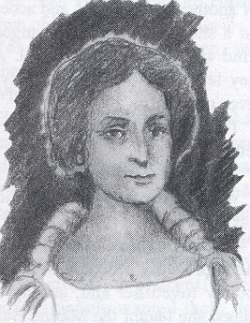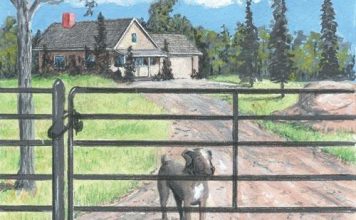 |
|
| Issue #30 • November/December, 1994 |
(This is a four-part series. Click the links to navigate to parts one, two, three, and four.)
(When we left off last issue, O. E. MacDougal and John Silveira were travelling from Ojai, California, to Ashland, Oregon. Mac was talking about the First Ladies and White House hostesses of the late 18th and early 19th centuries, and had just finished telling about Anna Harrison, the wife of President William Henry Harrison, who served the shortest time in the White House. — Editor)
“Who’s next?” I asked.
Letitia Christian Tyler
“Well,” he said, “Harrison was the first President to die in office. His vice president, John Tyler, succeeded him but no one really knew what a vice president was actually supposed to do when the President died. So, the first thing Tyler did was make it clear he wasn’t just filling in while another President was chosenhe was now the President. It was an important precedent.”

Letitia Christian Tyler
“So, what was the new First Lady like?”
“Letitia Tyler was a quiet, aristocratic southern woman. Her courtship with John lasted five years. And talk about slow engagements. She didn’t allow him to kiss her until three weeks before the wedding, and then it was only on the hand.”
“They sound pretty cold to me.”
“It was the times. Once they got married, they made up for it. She had nine pregnancies, eight births, and seven of their children lived beyond infancy. Only one other First Lady, Anna Harrison, had more children.
“Throughout his political career, she avoided the limelight. But she was devoted to him and they were apparently very happily married.
She was extremely competent, and it was only because of her shrewd business investmentsgiving the family financial stabilitythat made it possible for him to pursue a political career.
But, when she was just 48, she suffered a debilitating stroke that left her an invalid. So, two years later, when he became vice president, he decided to spend the entire of his term at their home in Virginia to be at her side. But Harrison, as I said, died a month after taking office and Tyler had to go to Washington. He was the President, now. Letitia, the dutiful wife, accompanied him. But, because of her paralysis, for the next two years she almost never left her room in the upstairs family quarters of the White House.
“The stroke also left her unable to speak, but she regained that function. Her intellect, however, had been untouched. I mention this because her husband, by his own admission, never made an important decision without consulting her first.”
“Who served as hostess since she was an invalid?”
“She had a 25-year-old daughter-in- law, a former actress, who served as hostess. But a little over a year into her husband’s administration, Letitia died. She was the first First Lady to die in the White House, and once more we had a widower President.
Julia Gardiner Tyler

Julia Gardiner Tyler
“But Tyler wasn’t just the first man to become widowed while President; he was also the first to marry while President.”
“Someone he met at the White House?”
“Yes. His second wife was Julia Gardiner. In her time, she was considered to be outrageously beautiful. Suitors pursued her on two continentshere and Europe. Someone somewhere gave her the nickname, ‘The Rose of Long Island,’ and several businesses used pictures of her on their productsall without her permission, of course.
“They met about a year after Letitia died. Julia’s family had just come back from a tour of Europe and they were invited to a White House dinner. A romantic would say it was love at first sightfor him, not herand throughout dinner he openly flirted with her. Afterward, they all retired to another room and played cards and he continued to flirt. As the Gardiners left, he even chased her around the room and tried to kiss her good night.”
“Wow, I could see the headlines on that one today.”
“Oh, it’s probably happened since. Several Presidents have been known for their attractions to women. But this was no one night’s dalliance. The next day he began his pursuit in earnest. He saw her as often as he could. He wrote to her almost daily and, two weeks after he met her, he proposed as they danced at a Washington ball. But she turned him down.”
“Why?”
“She was 23he was almost 54.”
“Now I can really see the headlines. But you said they wound up married. What changed her mind?”
“Later, she and her family accepted yet another invitation to be with Tyler. This time they took a cruise along the Potomac aboard the Navy warship Princeton. A new Navy cannon was to be tested and, while the crew readied the gun, Tyler, Julia, and many others went below decks. On the top deck the cannon was fired. It exploded and killed five people including her father.
“When the news came down below, she fainted. Tyler, himself, carried her unconscious from the ship. Later he ordered a state funeral for the dead and spent several weeks consoling her.
“During that time, her view of him changed. She saw more and more of him and several months later they eloped to New York.”
“Wow, exploding cannons, romance, a president sneaking off to New York to get married; they didn’t tell us about this stuff in school.”
“And we’re poorer for it, too. Think of how much more interesting history would have been.”
“How’d they get along? I mean, the age difference didn’t go away.”
“It seemed the longer they were married, the more she came to love him. And she especially loved his letters to her. In fact, it was the letters he wrote right after they’d met that made it so difficult for her to stop seeing him. If he’d been any other man, the age difference would probably have doomed them, whether he was President or not.”
“So, how long was she actually First Lady?”
“Eight months. He was nominated for another term in 1844 and accepted, but a short time later he changed his mind and didn’t run after all. After they left the White House, they had seven children.”
“That means he had 15 kids, altogether.”
“That’s right. It’s the record.”
“What kind of a First Lady did she make?”
“A good one. She was full of energy and kept a busy schedule. Washington society loved her and, among other things, she taught the Marine Band to play ‘Hail to the Chief,’ and it’s been the standard accompaniment for the President’s entrance ever since.”
“She started that?”
“Yes. When they left the White House, they moved back to Virginia, his home state and, though she’d been born in the North, she adopted her husband’s Southern sympathies. When tensions built before the outbreak of the Civil War, she made it clear she was supporting her husband’s views, and her family all but disowned her.”
“How much longer did he live?”
“She was just 42 when he died. Twenty-seven years later, when she died, it was in the same hotel where he had died.”
“Is that important?”
“No. You can just put it in your gee-whiz file.”
“Okay. Did she ever remarry?”
“No. No widowed First Lady would remarry until the twentieth century.”
“By the way, years later, when secession of the Southern states became inevitable, her husband was elected to the Confederate House from Virginia, but he died before he could serve.
I watched a sign for towns called Proberta and Gerber go by. “I just can’t believe he had 15 kids,” I said.
Sarah Childress Polk

Sarah Childress Polk
“You’re still thinking about that, huh? Well, that’s the Presidential record. But the next President and First Lady made up for it. They didn’t have any.”
“Who were they?”
“James and Sarah Polk. She was an unusual First Lady. Perhaps because they were childless, she dedicated her life to him and served as his personal secretary while he was in Congress, while he was governor of Tennessee, and later when he became President.”
“Did they want kids?”
“I don’t know but they didn’t miss them. There’s nothing in their letters or anything their contemporaries wrote to show they were anything but indifferent to children. And this was in a day when a woman’s success was often measured by how they raised a family.
“She was, however, well liked by Washington society. Included among her best friends were the wives of some of her husbands political enemies. You wouldn’t see that today. She also formed friendships with some of the most powerful and influential men of her time including the former President, Andrew Jackson, who had helped her husband’s career; Franklin Pierce, a future President near whom the Polks lived when James was a Congressman;. and there was Joseph Story, one of the Supreme Court Justices. Her circle of friends alone made her unusual in her time.
“But they were unusual times, anyway.
The country was changing.”
“What do you mean?”
“With Jackson’s election, the old guard was gone from the White House. John Quincy Adams was the last man who might be called a Founding Father to be elected to the presidency.
“So, by Polk’s time, all the original patriots were either dead or too old to be elected. There was a new criteria for attaining the presidency: you had to be popular. And Jackson was extremely popular. He was a ‘peoples’ president.
“Also, the lot of women was changing. More and more of them went outside their homes for jobs. The great mills of the Northeast were being built and women were a ready and cheap source of labor.
“Women’s rights also became an issue. During Polk’s administration there was a convention of women in Seneca Falls, New York. Those who attended demanded improvements in educational and job opportunities for women and they wanted more say in family matters. Married women of the time were considered just another possession of their husbands.
“What’s ironic is that the most controversial issue at the meeting was suffrage.”
“Why?”
“Many of them didn’t think they needed the vote.”
It sounded strange to me, but I didn’t ask him to explain why.
“Anyway,” he continued, “Sarah’s husband is considered the first ‘dark horse’ president.”
“What’s a dark horse candidate, anyway?”
“It’s someone who’s not considered a contender but who suddenly emerges from the back of the pack to be among the leaders. It’s a horse racing term. Polk was not one of the leading contenders for the Democratic presidential nomination in 1844. But he emerged as one, winning out over Henry Clay…”
“The man you called the Harold Stassen of his time.”
“Yes…and also Van Buren, who had been the eighth President.”
“Why was he chosen?”
“Clay and Van Buren opposed the annexation of Texas, which nine years before had seceded from Mexico and now wanted to become part of the United States. Polk not only wanted Texas, but he wanted the Oregon Territory, which was in dispute with Great Britain. Apparently, the American people wanted them, too, because they made him President.
“By the end of his administration, Texas, along with what was called the Mexican Cession, was annexed and the northern border of the Oregon Territories was settled along the line that forms the northern border of the State of Washington and runs east. The United States established claim to more territory under Polk than any other President before or sincealmost 1.2 million square miles, one third of what is now the U.S.”
“You’re kidding. If you’d asked me who he was before this ride, I wouldn’t have known.”
He laughed. “You and tens of millions of others.”
“What was Sarah like?”.
“Many of her contemporaries thought she had too much influence on her husband. It could have been true. Polk was an incredibly effective President and Sarah was a big help to him. If some historian made a case that James Polk would have been nowhere near as effective as he was, or even that he wouldn’t have made it to the White House, without her, I wouldn’t argue. I think, quite possibly, she was the best First Lady we ever had.”
“So, you’re saying…” “I’m saying, the United States might not be anywhere near as big as it is today if any woman, other than Sarah Polk, had become First Lady in 1845.”
“How come I didn’t know who the Polks were?” I asked.
He shrugged. We passed a sign that said Jellys Ferry Road. Someday, I’m going to drive down that road.
“She was a bright, opinionated woman” he said, “and not only James but other Washington politicians often discussed the issues of the day with her.
“She read all the correspondence and newspapers that came to James and she marked what she thought deserved his attention and passed them along to him.
“But, for all the support she gave him, she didn’t like the expectations others had of her. She didn’t want to be a White House hostess and she didn’t want to entertain at parties. She didn’t like the time these things took away from helping her husband.
“She also guarded him against the world and was vindictive toward anyone who criticized him. On at least one occasion, she intercepted and destroyed a White House invitation before it could be sent out because it was going to a man who had criticized him. Martin Van Buren’s son also criticized him and she banished him from the White House guest list for the rest of James’s administration. There were probably more instances of this.
“So, not everyone liked her,” I said.He shook his head. “Anyone as strong willed as she was has a way of making enemies.
“Nowadays, Polk’s administration is remembered as having been dull, and about all Sarah’s remembered for is having the gaslights installed in the White House. I suppose in some ways it was dull. The Polk’s were teetotalers, and after White House dinners guests often went to Dolley Madison’s house to get an alcoholic drink.”
“I remember you saying that when you talked about Dolley Madison,” I said.
“Also, though she liked music, she felt there were times when it was inappropriatelike on Sundays. In fact, at the inaugural ball, in her husband’s honor, the dance music stopped as a courtesy to her when she entered the room.”
“How many terms did he serve?”
“One. It was all he wanted. He accomplished everything he’d set out to achieve in four years. He died less then eight weeks after he left office.”
“Good grief. What happened to her?”
“She lived another 42 years. But she remained a significant figure in American society. When the Civil War broke out, her sympathies were with her native South but she also opposed secession. Her home became off limits to all the combatantshigh tribute to a First Lady no one remembers today.
“In fact, historical treasures were stored at her house because everyone knew they would be safe there.
“She remained popular until the day she died and her political opinions were sought by many of the men of her time years after the Polk administration ended.”
“No kidding.”
“By the way, did you know she’s related to the artist you have working for the magazine.”
“Don? Don Childers?”
“Yeah. The spelling of his name and her maiden name are different, but that’s because his branch of the family took a different spelling.”
“Does he know this?” I asked.
“Of course he does.”
Margaret Smith Taylor
“So, who’s next?”
“Next was Zachary Taylor’s wife, Margaret. Just before he was elected, the Taylors were ready to retire to a plantation they’d bought in Mississippi. He’d already had a long career in the army and she had followed him from one primitive outpost to another; from the mosquito infested swamps of Florida to the forests of Minnesotawhich, incidentally, are filled with snow in the winter and mosquitoes in the summer.”
“How many kids did they have?”
“They had five daughterstwo of whom died of malariaand a son. The life of a military officer’s wife in primitive America was a tough life. Neither Margaret nor her husband wanted their daughters to marry military men. So, of course, kids being kids, one of them did. She eloped with a West Point graduate who was later to become the President of the Confederacy.”
“Jefferson Davis?”
“That’s right.”
“He was related to a President of the United States by marriage?”
“He was related to two Presidents by marriage.”
“Two? Which other one?”
“After his wife died of something called river feverand they’d only been married three monthshe married the aunt of Franklin Pierce’s wife.
“I made a note of that. “Let’s get back to Margaret Taylor. What kind of a First Lady was she?”
“Not much of oneif you were looking for excitement at the White House. She was 61 when her husband became president and she really didn’t want to be a society woman. She all but refused to entertain and she more or less confined herself to the family quarters in the White House, just as Letitia Tyler had done. She left all the entertaining to her two surviving daughters.
“And because of this reclusive behavior, she became the subject of much Washington gossip. Rumors had it that she was uncultured and uneducated, when in fact she was one of the first First Ladies to have a decent education. There were even rumors that she wiled away her days sitting in her room smoking a corncob pipe like some sort of bumpkin.”
“Did she?”
“Of course not.”
“She sounds like she was miserable.”
“Her misery didn’t last long. Fifteen months after his administration started, Taylor was dead and she died two years later. But from the day her husband died to the day she died, her only memory of her days in the White House was his funeral.”
“That’s sad.”
“As I said, many of the women who became First Ladies didn’t want to be.”
Abigail Powers Fillmore

Abigail Powers Fillmore
“I was thinking of using this talk as the basis for a story in the magazine,” I said. “But this is becoming pretty depressing.”
“That’s too bad because the next First Lady didn’t really like the job, either.”
“Who was she?”
“Abigail Fillmore, the wife of Millard Fillmore. She was the daughter of a preacher who died when she was an infant. Though he’d left the family in poverty, he also left behind an extensive library, and her mother used it to educate Abigail at home.
“She was a good student. She also taught herself French and how to play the piano. By the time she was 16, she became a school teacher and that’s how she met her husband.”
“A fellow teacher?”
“He was a student. When she was 20, he walked into her classroom and asked for help. He was just 18. She consented and, while still her student, he began to court her.”
“People get fired for that today,” I laughed.
“Their courtship lasted eight years before they married. He became a lawyer and, though a professional man’s wife was not expected to work once she married, she continued to teach two more years while he established his law practice in Buffalo.
“Before they went to Washington, their home became a center for the local intellectuals in the Buffalo area, and she was well known for both her learning and her wit.
“What kind of First Lady was she?”
“She delegated the hostess duties to an 18-year-old daughter. But she did institute some changes. It was during Fillmore’s administration that piped water was brought to the White House, and Abigail had the first bathtub installed. Also, up until that time, White House cooking was done in an open fireplace in the kitchen and she had the first iron range installed. But what she’s remembered for most is establishing the first permanent library in the White House.”
“Did she have much influence on her husband’s policies?” “No. But if Millard had listened to just one piece of advice from her, he might have been reelected in 1852.”
“What was that?”
“She told him not to sign the Fugitive Slave Act of 1850. The Act made it easy for Southerners to reclaim runaway slaves who fled to the northern states. He thought, by signing it, he would win support in the South that would ensure his reelection. But the Act so infuriated northern abolitionists that many of them left the Whig party, to which he belonged, and joined the new Republican Party. The Whigs, in fact, didn’t even renominate him. They chose General Winfield Scott, one of the heroes of the Mexican-American War.”
“So, if he’d listened, he might have been reelected,” I said.
“Right. But Abigail wasn’t sorry to leave the White House. When Franklin Pierce was elected, she and her husband were free to retire. The first thing they did was plan a trip to Europe. They bought maps and books, packed their luggage, and were ready to leave right after they attended Pierce’s inauguration. But the weather was cold and drizzly that inauguration day and Abigail got sick. A few weeks later she was dead.”
Jane Appleton Pierce
“You keep doing that to me. Tell me Pierce’s wife enjoyed her stint in the White House.”
“You’re out of luck. Jane Pierce was one of the most tragic of First Ladies. She had consumption, her husband was an alcoholic, and just a few months before his administration began, she and her husband were eyewitnesses to the gruesome death of their 11-year-old boy in a train wreck.”
I grimaced.
“Two of their other sons were already dead, one as a baby and the other when he was four. With the death of the third one, I think she snapped because she spent most of her time in the upstairs family quarters of the White House composing letters to the dead eleven-year-old.”
“Another recluse,” I said.
“That’s right. She became known to Washingtonians as ‘The Shadow in the White House.'”
Harriet Lane
This is getting depressing. Tell me that the next President’s wife fared better.”
“Can’t. The next President was a bachelor.”
“That’s good news. I mean, that’s great news. Who was he?”
“James Buchanan. But, though he never married, he did have a White House hostess. She was his orphaned niece, Harriet Lane. He’d become her legal guardian when she was nine.”
“How did Washington society feel about a young niece being the White House hostess?”
“In case you’re not catching on, they liked almost all the young hostesses. With the exception of Sarah Polk, Washington had been treated to a string of First Ladies who were withdrawn or sickly. But Harriet was not only bright, she was beautiful and sociable. The song, “Listen to the Mockingbird,” was dedicated to her and Washingtonians were glad to have someone who didn’t hide upstairs. She became so popular that ‘Harriet’ became one of the most popular names for baby girls of that time.
“But she was no stranger to the political social scene when her uncle was elected. He’d been appointed minister to London in 1854, two years before he became President, and she went there with him. She was just 24 at the time but she became such a favorite of Queen Victoria that the Queen conferred upon her the rank of Ambassador’s wife.
“She toured Europe and met other dignitaries and royalty and was a hit with everyone.
“Her uncle worried about her falling under the spell of all this flattery she received, then returning to the United States with European affectations. Elizabeth Monroe’s daughter, Elizabeth Hay, had done that and Washington society resented when she acted as hostess for her mother. But that didn’t happen with Harriet. Washington loved her and the White House years were good to her. She enjoyed the experience.
“Buchanan left the White House in 1861 and he and Harriet returned to his estate, called Wheatland, near Lancaster, Pennsylvania. She was then 31 and still unmarriedlike her uncle.
“When she turned 36, she married Henry Johnston. They had two sons but, by 1884, her uncle, her two sons, and her husband were all dead.”
“You’re kidding.”
“Nope. The woman who was orphaned at nine was alone again. She had no known living relatives.”
“Wow.”
“Later in life, she collected art and willed her collection to the Smithsonian. It formed the basis for today’s National Collection of Fine Art. Most of the rest of her estate was used to establish the Harriet Lane Outpatient Clinic. It still exists today, as part of John Hopkins Hospital.
Mary Todd Lincoln

Mary Todd Lincoln
I caught a sign out of the corner of my eye. It told me we were going through La Moine.
“Mary Lincoln was probably the most tragic of the First Ladies. Other First Ladies have endured assassinations, scandal, the deaths of children, philandering husbands, but Mary got it all. To top of it all off, she was crazy.”
“Crazy? Really?”
“A lot of people thought so including her husband, and if she wasn’t she was, at the very least, the most eccentric First Lady we’ve ever had. Among other things, she claimed she was a psychic and swore she’d foreseen his election to the presidency. And she was so moody and volatile that Abe often grabbed the kids and got out of the house until her anger passed.
“Often, her rages were fits of jealousy.”
“Jealous of what?”
“Any woman who came near him. A lot of historians attribute this to some shrewish part of her nature. But she may have had good reason not to trust Honest Abe. Today, there are medical historians who believe he had contracted syphilis at some point, either before or after he married Mary, and that he transmitted it to her. You may not want to put that in your story because I’m not sure if it’s ever been confirmed.”
“How far did her jealousy go?”
“Oh, she did some outrageous things.”
“Like what?”
“In one famous instance, she arrived late to a ceremony where Lincoln was reviewing troops. When she got there, another woman was riding beside her husband. When the review was over, the woman approached Mary to greet her. Mary let loose with a tirade that included accusations of adultery. By the time she found out the woman was the wife of General Ord, she had already reduced the woman to tears.
“Another woman who witnessed this episode would one day become First Lady herself. She was Julia Dent Grant, wife of Ulysses S. Grant, and she had seen many of these outbursts. She made it a point to decline invitations to go to the White House or to socialize with the Lincolns because she didn’t want to become a target herself. Most people don’t know it but the Grants were supposed to be at Ford’s theater the night Booth shot Lincoln. Julia had declined the invitation.”
“He might have killed them both.”
“Might have.”
“Her moods and fits of temper became so frequent and public that those around her, including her husband, suspected insanity.
“In spite of this, Lincoln genuinely loved her. The night Booth shot him, he was holding Mary’s hand.
“She was, incidentally, the first First Lady to be widowed by assassination. But she didn’t get much sympathy. The public never learned to like her, and newspapermen had a field day with her.
“Even though she came from a slave stateKentuckywhich stayed in the Union during the war, most of her family sided with the South and many of her brothers served the Confederacy. Because of this, she was often accused by Northern critics of being a Southern sympathizer and even a spy. But, if the truth were known, she may have been even more of an Abolitionist than her husband.”
“There were others who disliked her because she seemed to give little thought to the war. Remember, Washington, D.C. was never far from the front during the war and there was always the fear of a rebel takeover of the city.
“And still more disliked her because, even though she had pretensions to thriftiness, she was probably the most prodigious spender the White House ever saw.”
“Really?”
“Oh, yes. She was unstoppable. Once, when Lincoln saw the bills she’d racked up, he said he couldn’t believe she could spend so thoughtlessly when the Union could barely afford blankets for the soldiers. Her debts exceeded his annual income as President.
“By the way, if you’re one of those those who thrive on parallels between Lincoln and Kennedy, Kennedy was appalled by the spending sprees of his wife.
“To her dying day, she remained an unpopular figure, hounded by the press and ridiculed even when she was a widow.
“After the death of her third son, she lost it completely. She spoke with imaginary people and continued to pile up debts on her spending sprees, buying things she didn’t use and often not even remembering what she bought. She seemed to sink deeper and deeper into psychosis.”
“What made her that way?”
“Who knows? It may have been the syphilis some doctors today think she got from Abe.
“She seemed to have had a good childhood. She was one of 15 children but her family wasn’t poor. Her father was an influential businessman. People like Henry Clay came to their home on a regular basis and Mary, we know, was well educated for a woman of her time. She often carried on conversations with these guests.
“She was a catch for the bachelors of her time. It’s said she was courted by two of the four men who years later contended for the presidency in 1860Lincoln, the man who was elected, and Stephen Douglas, whose name is forever linked with Lincoln’s in history. But I don’t know if it’s true she was courted by Douglas.”
“Her behavior must have been hard on Lincoln.”
“Sure. One of the recurring themes in American history is men who succeed because of the women who supported them.”
“Like John Adams and James Polk,” I said.
“Like Adams and Polk. But Lincoln became President and achieved greatness in spite of Mary’s destructive behavior.”
I nodded.
“Finally, with her husband and three of her sons dead, and her becoming more and more bizarre, her last surviving son had her committed to an insane asylum.”
“Committed?”
“She was only there a few months before one of her sisters and some of her friends got her released. But her bizarre behavior continued. She left the country in 1868one step ahead of her many creditorsand drifted around Europe for a few years. She didn’t come back until 1871 when Congress authorized a pension for her. I should add that the law authorizing a pension would have lost in Congress because some Congressmen refused to vote for the pension unless Sarah Polk was granted one. So you could say Mary Lincoln’s pension was granted only because of Sarah’s popularity.
Anyway, once she returned, she lived out the rest of her life with the sister who had freed her from the asylum. She died in 1882.
Eliza McCardle Johnson
“Who followed her?”
“Andrew Johnson’s wife, Eliza McCardle Johnson.”
“Tell me she was happy.”
“She was miserable.”
“Thanks.”
“The Johnsons were one of the few presidential couples both of whom were born into poverty. They married when she was 17 and he was 19. Her father died when she was just a girl, and she herself spent most of her adult life sickly and tubercular. But her mother made sure she acquired an education. Andrew, however, was illiterate when they met and apprenticed to be a tailor. She tutored him, teaching him to read and write, and became the second First Lady to educate her husband.
“What made her miserable?”
“Everything. Her husband wouldn’t support the vengeful Reconstruction policies the Republican Congress wanted to impose on the defeated South. So, the Republican majority in the Househis own party, mind youimpeached him and he was tried by the Senate.
“Because of his unpopularity, she lived in constant dread that he would be assassinated, like Lincoln.”
“He was cleared by the Senate, wasn’t he?”
“By one vote.”
“How did Washington society like her?”
“She shunned them and they shunned her. The White House functions she attended could probably be counted on one hand.
“Fortunately, her eldest daughter, Martha, served as hostess, and though Eliza and Andrew were two of the most unpopular people in Washington, their daughter was well liked.”
“I’ll bet they didn’t miss Washington when they left.”
“She was relieved when Grant was nominated in 1868 and they could go back to Tennessee.
“Eventually, Andrew was embraced again by his fellow Tennesseans, and he was reelected to the Senatethe body that had tried himin 1875. But he died that year and she died a year later.
“I’ll tell you,” I said, “the more you talk, the worse it seems for a woman to be the President’s wife.”
“Funny you should say that just now because the next First Lady loved the position.”
“Well, it’s about time.”
Julia Dent Grant

Julia Dent Grant
“Julia Grant claimed her eight years in the White House were the happiest of her life. Like many First Ladies, she was a woman born into wealth, who ducked below her station to marry a man who later became President of the United States. Also, as with many of those who preceded her, she came from a family of slaveholders. But, because her husband was the only Union general who could stay in the field with Robert E. Lee, he may have been the one man most responsible for the defeat of the South and the fall of slavery.”
“Who did her family side with?”
“Like Mary Lincoln’s family, most of her family sided with the Confederacy. After the war, both of their fathers moved into the White House to live with them. Need I tell you what happened? Her father still sympathized with the South and his father sided with the Union. The two old men, constantly sniping at each other, became subjects of the national press and amused the whole country.”
“You don’t hear many good things about Grant,” I said.
“Let’s face it, he was one of only three great generals that war produced, but he was a failure in almost everything else. He failed at farming, as a clerk in his father’s leather goods store, he even failed as a soldieruntil the war.
“But, through it all, she stood by him, and loved him.
“Then the war changed everything. When it started, he volunteered. He had a string of spectacular successes and rose through the ranks until Lincoln chose him to be the man the Union needed to oppose Lee himself.”
“Was she a help to him through all this?”
“She was a stabilizing influence on himone of the fewand she very likely helped keep down his drinking sprees. And he, in turn, was in love with her.
“She was homely, rather dumpy, and in most photographs we have of her, she’s not facing the camera because she was cross-eyed. She once told Ulysses she was planning to undergo a surgical procedure that would correct it. He said, ‘No.’ Her eyes were like that when he fell in love with her and that’s how he wanted her to stay. So, she forewent the operation.
“She was a very popular First Lady. The first one since Sarah Polk. One reason was that she befriended so many of the wives of the Congressmen and Cabinet members. These women had lived in Washington for years. They knew the social climate and the ins and outs. Either by design or good fortune she got them on her side and that was more than half the battle to be accepted and respected as the First Lady.
“She created truly democratic White House socials. The women who attended themby invitation onlycame from all walks of life and they dressed according to their means. Julia didn’t tolerate snobbery.
“Incidentally, the term ‘First Lady’ first appeared as a reference to her in a newspaper at this time. But it still didn’t see widespread usage until it was used to describe Lucy Hayes several years later.”
“It’s nice to hear she liked being First Lady.”
“She liked it so much that she would like to have seen Grant serve a third term. But, by the end of his second term, his administration was so scandal ridden that, even though he was still one of the most loved men in the country, the Republicans didn’t want him in the White House any longer.
“What did he do?”
“It wasn’t what he did, and very few people believed him to be at the root of the scandals that plagued his administration. The problem was that he surrounded himself with men who proved to be unscrupulous and, when they were caught, he made the mistake of standing by them.”
“I guess his crime was that he was a bad judge of character.”
“That and his trusting nature would plague him for the rest of his life.”
“Even after he left the White House?”
“Even then. After his presidency was over, he and Julia travelled around the world and they were wined and dined by world leaders from Europe to Japan. But, when they returned to the States, he was once again doomed to failure. There was no job he could hold and, because he was so trusting, he turned his family’s fortune over to a shady investment firm and lost everything. His family, so recently secure, was suddenly destitute.
“About this time he was also diagnosed with terminal cancer.
“A publisher, knowing a good thing when he saw it, approached him with a proposal to write his memoirs. Grasping for straws, Grant accepted.
“Mark Twain, the most successful American writer of his timeperhaps of all timelooked at the contract and told Grant he was being taken. He personally offered to underwrite the book and said he’d give Grant an equitable royalty.
“So, Grant wrote the book while he was dying. Much of it on a porch at a resort in the Adirondacks. People came from miles away to stand and watch the dying man, the most famous American of his time, sitting there writing his book.
“Have you read it?”
I shook my head.
“It’s great. He speaks honestly about himself, how he grew up, and how and why he conducted himself as he did in each of his military campaigns. Someday, teachers in high school and college are going to rediscover it, and they’ll assign it as not only a source of U.S. history but as a model of clear and economical writingor at least they should.
“What he didn’t cover in his book was his administration as President. He probably couldn’t have even if he had wanted to because he died within days of finishing it.
“It was the only American book to outsell Twain’s in the last century.
Suddenly, we were pulling off Interstate 5 and into Ashland.
“There were those who thought Twain had written the memoirs himself. There’s no reason to believe so. It’s in a simple and elegant style that more writers probably wish they could write in themselves.
“It made a fortune and Ulysses left Julia and the rest of his family financially secure.”
“The success of his book inspired her to write her memoirsshe was the first First Lady to do sobut she didn’t write like Ulysses did. Her book remained unpublished until 1975, 73 years after she died.”
“She must have been the antithesis of Mary Lincoln,” I said.
“One of the traits that made Mary infamous made Julia endearing to the public.”
“Really? What was that?”
“Both were extravagant spenders. But American was entering the ‘Gilded Age’ during Grant’s administration and people were trying to forget the war. She didn’t go through money the way Mary did, but she was a big spender, nonetheless.”
“Was she ever accused of influencing her husband’s policies?”
“Unlike some other First Ladies, she not only had no influence on her husband’s policies, she rarely understood them. On at least one occasion, she placed herself squarely on both sides of an issue.”
“Did she leave a mark on the White House itself?”
“Not much I can think of. She had the Grecian columns added. That’s about all.”
Up ahead I saw Duffy’s pickup parked in the parking lot of a restaurant. I had hoped he wouldn’t be there yet.
Mac spotted him. “We’re at the end of our trip.”
The end of the story, I thought.
“Do you think we’ll be able to talk about this another timemaybe finish it?” I asked.
“Some time. Do you think your readers would really want to hear more about it?”
I shrugged. “Maybe this is enough.”














